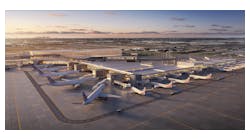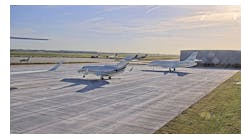AAR Corp. didn't invent aviation, and it never leaves the ground. But it invented the invisible industry that keeps things flying, and in May it will reach its first billion-dollar mark in revenues.
AAR is the Wood Dale-based company that has become virtually ubiquitous in worldwide commercial, general and military aviation-support services. It owns the spare parts inventory for Mesa Airlines and nine others, plus seven defense contractors. It manages the supply chain solutions for all of the intelligence-gathering AWAK aircraft of the British Defense Ministry and most of America's similar planes as well. It repairs and overhauls the most sophisticated avionics and hydraulic systems. It builds and installs a vast variety of temporary units, such as mobile kitchens, storage shed and electronic field control centers that are used today in Iraq, Afghanistan and in refugee havens from New Orleans to the Sudan. And in its spare time, AAR leases Boeing 767 and Airbus A310 jetliners.
CARVING OUT A NICHE
In essence, AAR has carved out a niche industry that has exploded with the trend to outsource the services that airports, airlines and defense contractors formerly did for themselves. While founded in 1951 in Elk Grove Village by now-retired chairman Ira Eichner, 75, as Allen Aircraft Radio (Eichner's middle name is Allen) and focused on instruments, AAR transformed itself in the '80s and again in the last five years. It stands as a one-of-a-kind enterprise with a mix of four distinct businesses supporting world aviation.
The company is No. 1 in the aviation supply chain market, with an estimated half-billion dollars in revenues for the fiscal year ending in May, or 51 percent of its total. This segment has 17 facilities around the globe, virtually taking over the spare-parts inventory management of airlines and defense contractors. Its operations are anchored in an information technology system that was home-grown. In aircraft maintenance, repair and overhaul, AAR ranks among the world's top 10 service companies, generating about $200 million in revenues this fiscal year.
At facilities ranging from Oklahoma City to Kuala Lumpur, its specialists tackle emergency repairs or ongoing maintenance roles.
One contract received this month came from Northwest Airlines.
"Our service center at Indianapolis airport will take over the task of heavy maintenance and interior modification on its Boeing 757s," AAR Chairman and CEO David Storch, 54, told me. "We'll perform nose-to-tail maintenance checks for five 757s and major interior space modifications on another 10 to reconfigure them with updated business class and coach cabins. This is an outsourcing first for Northwest."
AAR's structures and systems division, with revenues expected to exceed $260 million this year, is ranked No. 1 in the mobile structures field. It also designs and produces in-plane cargo loading and handling systems for commercial and military aircraft and provides turbine engine overhaul. Finally, the Aircraft Leasing division leases used commercial jets and provides advisory services in remarketing planes and records management.
Riding the momentum of a record year, with $210 million in capital available, and with Wall Street estimates that earnings per share might grow from a projected $1.43 for May 2007 to $1.88 in the next fiscal year, Storch is still dissatisfied with AAR fundamentals. He's confident of a 20 percent average annual growth rate as the industrialized world increasingly relies on aviation, and the outsourcing habit becomes ever more addictive. But he's determined to tinker with the business mix.
SEEKING BROADER GEOGRAPHIC BALANCE
His five-year goal is to achieve more geographic market balance, boosting overseas sales from 25 percent to 45 percent, to grow his structures segment to a greater proportion and be less dependent on any single market. He intends to do this by placing far greater stress and investment on value-added engineering services, and by finding local partners in China and other Asian markets. "I also have my sights on boosting our defense business from 37 percent of the total to 45 percent," he adds.
The current momentum is the result of almost a full career's work for Storch. A native of New York City who holds a degree from Ithaca College, he joined AAR in 1978, when it was at $90 million in revenues.
Playing numerous key roles in its development as a uniquely diversified specialist, he took over the top spot exactly 10 years ago. Now, with the enterprise 10 times larger, AAR's 3,700 people all might be still on the ground, but he's dead set on making it fly faster and higher than ever.
Ted Pincus is a finance professor at DePaul and an independent communications consultant and journalist.
e-mail:
Copyright 2005 LexisNexis, a division of Reed Elsevier Inc. All rights reserved.
Terms and Conditions | Privacy Policy
News stories provided by third parties are not edited by "Aircraft Maintenance Technology" staff. For suggestions and comments, please click the Contact link at the bottom of this page.





